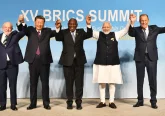On May 24, 2011 at the Nissan Centre, St. Antony’s College, the book “The Korean State and Social Policy: How South Korea Lifted Itself from Poverty and Dictatorship to Affluence and Democracy” was launched. This lively event brought together all five authors of the book: Stein Ringen, Huck-ju Kwon, Ilcheong Yi, Taekyoon Kim and Jooha Lee. Their goal was to explain the mystery of South Korea’s successful and smooth transition from authoritarianism and poverty to an affluent stable democracy. The authors stressed the importance of governance under authoritarian rule, and explored it through the prism of South Korean social policy from 1945 to 2000.
Mixed governance, or state’s collaboration with other actors was at the core of the presentation and the book. Before democratisation, under the authoritarian rule of the President Park Chung Hee, the South Korean government employed social policy to mobilise alliances with different non-state actors. This social policy was focused on inclusion of different groups into the regime. The speakers discussed the state’s delegation of responsibility to civil society, trade unions, local communities and business actors. Social policy, however, including land and education reforms, already existed before President Park came to power in the 1960s. This clearly contributed to the success of his modernization reforms.
The speakers did not deny the ruthless nature of authoritarian rule that overshadowed its effective governance. They explained that the government ruled with two different faces at the same time: one of a repressive regime, and the other of a collaborative government promoting national development. The development that occurred under Park’s rule, including the creation of civil and political institutions, laid foundations for democratic governance. With this notion the authors add much nuance to conventional debates on authoritarian rule, which is typically seen as coercive and failing to enact balanced economic policies.
When asked about the reasons for social policy eventually leading to democracy, their response was that it empowered different social groups, which eventually demanded a wider political change. Social policy then, while legitimising the regime in the short-term, ended up contributing to its eventual overhaul. This was an interesting predicament for other contemporary authoritarian regimes that incorporate limited plurality into their governance.
The authors agree that there are continuous challenges facing South Korea, including the obvious security issue of North Korea, as well as domestic struggles to further increase state spending on social policy. But their outlook was upbeat. South Korea has already demonstrated its incredible capacity to address economic and political problems. This discussion and the book provide alternative perspectives on a variety of important political debates beyond South Korea, including that of democratic transition, the nature of authoritarian governance, and the relevance of social policy as a method to analyse internal dynamics of political regimes.
The social policy approach may be fruitful in studying other authoritarian regimes, as it provides a window into often invisible complex relationships between the state and non-state actors. More discussion on comparative governance in authoritarian regimes would have enhanced the discussion. Collaboration between state and non-state actors is present in other authoritarian regimes, such as China. And while Professor Ringen commented that we don’t know enough about governance in China to explain to what extent it could be comparable to that of South Korea under authoritarian rule, China scholars might disagree. The rich scholarship on modern governance in China could make for a fascinating comparison.
The book was published by Oxford University Press on May 12, 2011. It is now available for purchase:http://www.amazon.co.uk/Korean-State-Social-Policy-International/dp/0199734356/ref=sr_1_1?s=books&ie=UTF8&qid=1308132856&sr=1-1







1 Comment
even though it is now affluent, it is still a pretty much an authoritarian state with little personal freedom
its internet is policed and censored as severely as China’s, free speech is often suppressed (one of few countries that file criminal charges against defamatory speech against head of state). The govt even enforces nation-wide lockdown on all videogaming servers after midnight for gamers under age of 16.